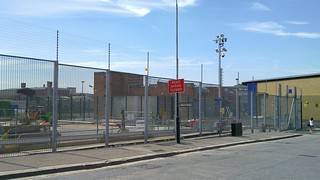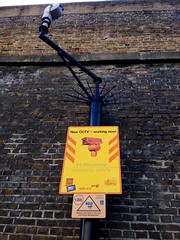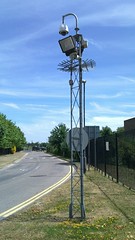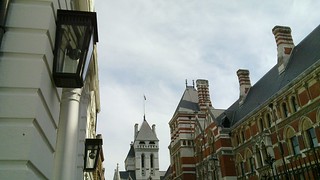
The National Counter Terrorism Security Office (NaCTSO) ran a counter-terrorism campaign for the travel industry this summer. It features a video titled How To Identify and Respond to Suspicious Behaviour that basically advises that atypical behaviour is suspicious and should be reported, i.e., autistics – and other neurodivergents – are suspect.
This campaign is problematic as it highlights that autistic behaviour should attract attention from police and security personnel. We, autistics, tend to have our idiosyncratic behaviours everywhere we go, and increased stress in a public space is likely to exaggerate our atypical behaviours. (This campaign worries me and consequently has raised my stress level, especially when going through transport hubs, as obviously I do not want to be wrongfully arrested again.) This counter-terrorism campaign is likely to exacerbate some of the very behaviours NaCTSO deems suspicious.
The accompanying ‘helpful leaflet’, again, lists examples of ‘suspicious behaviour’ that are common autistic behaviours:
- Loitering in restricted or public areas
- Paying significant interest to: entrances, exits, CCTV or security staff, taking photos
- Concealing face / identity
- Asking unusual or security related questions
- Avoiding security staff
- Activity inconsistent with the nature of the building or area
I have done all of them. I am autistic, not a terrorist.
A few of my photographs of CCTVs and one of a police officer observing from behind a curtain in Downing Street:






Terrorists will never be reliably identified. That is just not possible. As there are many more neurodivergents (a prevalence rate of 1% for autism is now considered a low rate) than terrorists (often mentioned as estimated to be about 3000 in the UK), identification measures with many false positives, such as those promoted in this counter-terrorism campaign, will not increase our security but will detrimentally affect neurodivergents. Focusing on atypical behaviour risks ruining too many lives and is not effective in protecting us from terrorist acts.
On a forum using Chatham House rule, in a discussion on this topic, a police officer suggested:
I think this is where we need to encourage autistic members of public to carry an autism card that can be verified by police - verification being important as cards would otherwise be abused by criminals. Anyone being stopped due to their autistic traits could produce their card and (in theory) be on their way quickly once their details have been confirmed.
As much as it would be nice to have a card that could just let you out of any situation, I see the role for autism cards as a communication aid, not as an enhanced privilege card. The card remains in the control of the autistic individual who can choose when to use it to facilitate communications. If well designed the card can be used in other context than just policing. Not all autistics will carry one and not everyone who carries one will want to use it. How autistics are being treated should not rely on the presence of such a card. The card has a role in helping communications by indicating some common or specific issues and possibly indicating the contact of someone to contact in an emergency. It is especially useful for non-verbal neurodivergents and those who become non-verbal in stressful situations such as an arrest.
Also for a verification scheme to be relatively robust would require a costly infrastructure including a (police) database of autistics. The history of databases identifying minorities raises many concerns. However, the main issue with such a system is about who has the power over our autistic identities. Currently the medical profession acts as a gatekeeper of the diagnosis. This is based on the medical model and is far from ideal. Services should be available on the basis of needs, not medical diagnosis, and one’s identity should not require an external gatekeeper. Adding to that, a police 'verified' system, would move some of the medical control into the hands of the police, this is the wrong direction of travel. We should move towards the social and neurodiversity models, not towards an even more authoritarian model.
Vigilance for hostile reconnaissance may not be the best counter-terrorism approach as it likely will criminalise a large population through false positives (and will waste police time). The problem is made worse by the ease with which some police forces may arrest people compared to their reluctance to apologise and offer compensation for erroneous and unlawful arrests. For instance, after my unlawful arrest, it took me more than four years for the Metropolitan Police Service to admit the arrest was unlawful and apologise (and twelve years later, their legal department still retains some files about that arrest).
The traumatising impact of ending in police custody for autistics, and other neurodivergent individuals, potentially targeted for their atypical behaviours by this counter-terrorism campaign can be serious if it ends up causing more wrongful arrests while not making us safer from terrorism.

This author has contributed to the new Autism: a guide for police officers and staff published by the National Autistic Society. The document contains simple dos and don’ts when interacting with autistic suspects, victims of crime and witnesses. It is a useful guide, however it would have benefitted from more autistic input such as case studies from detained autistics as well as the two from police forces.
The example interview question in the following extract from p. 22 (p. 41 of the 2020 edition) comes from my police interview:
Finally, it is really important not to use leading questions. Autistic people (unless they also have accompanying intellectual impairment) are not more suggestible than non-autistic people. However, they may be more likely to agree with the interviewer’s suggestions or to statements that are untrue, and not understand the consequences of this.
For example asking, “Has your laptop got anything on it about plans for any terrorism acts?” is likely to elicit agreement, as a web browser or a text editor could be used to plan anything.
I wrote about this interview question in my ‘Calm, almost too calm’ chapter in the Being Autistic book and talked about it in a video about how typical autistic behaviour is considered suspicious for an Ask Autism training module.
2020-10-06 Update: A new edition of this guide is available from the National Autistic Society.
Professor Roy Richard Grinker gave a lecture titled ‘The Changing Values of Autism: From Disease to Citizenship in Late Capitalism’’ in London last month. One of his slides, on the ‘Prevalence and access to services’, featured two boxes side by side, each with differently distributed dots in them.
It is available at 43’29’’ in the video of his lecture:
With this slide on, Prof. Grinker commented:
In each of these boxes we have 80 dots. Same number. 80 dots here, 80 dots here. Please don’t count them, but I swear there are 80.
Prof. Grinker is obviously a long term participant in the Autism Industrial Complex, an expression he regularly uses in his lectures, and you would think he would be fully aware of some common attributes of autistics. I am thinking specifically of attention to detail and honesty.
When leaving the auditorium I mentioned to him that they were not 80 dots in the left box. He reiterated there were 80 dots in each and that he had asked us not to count the dots!
I followed up by email and pointed out that one didn’t need to count. The left box has 10 columns of 8 rows, so for there to be 80 dots, all intersections need to have a dot. It is visually obvious that this is not possible. If you zoom in on the screen capture of the video, you should be able to count 68 dots in the left box and 75 in the right, so neither have the claimed 80 dots.
It would have been easy to create slide matching the content, but instead Prof. Grinker asked us to trust his lie and then didn’t bother to respond to an email about it compounding this lack of veracity with a lack of respect.
This post appeared first on AutAngel’s Speak up blog, which accepts comments.
The Hackney council established an Autism Alliance Board in 2016 to eventually create an autism strategy for the borough. Autistics, parents and carers joined to establish a User Engagement work group to contribute to this work.

One of these documents, the Terms of Reference of the Hackney Autism Alliance Board, reflects some early successes of our work group:
The Board has also adopted some Engagement and Consultation Principles that were developed by our work group. These principles include a section on autistic representation on the Autism Alliance Partnership Board, which was the basis for most changes to the Terms of Reference and also for ensuring that autistic representatives and carers on the board should be remunerated for their participation. Another section on accessible meetings suggest accommodations for sensory needs and that if an autistic representative needs a break, the meeting is suspended for everyone. These principles also recommend that consultation on the strategy is conducted in ways to make it accessible to most autistic Hackney residents.
Work is now about to start on drafting the strategy. If you’re autistic and live in Hackney, check out the Autistic Hackney web page to find out how to join our User Engagement work group and contribute to the strategy work.
Transport for London (TfL) has published information about how long it retains footage from some of its many CCTV surveillance cameras on its Surveillance Cameras and Road User Charging web pages and the Metropolitan Police Service (MPS) has published some additional data in a letter (pdf) to the Chair Police and Crime Committee of the Mayor's Office for Policing And Crime (MOPAC) dated 2017-02-06. Here's the combined data:
- London Underground stations: 14 days (according to TfL)
- London train stations (including tube): up to 14 days (according to the MPS)
- London Underground trains: 72 hours
- TfL Bus stations: 30 days (according to TfL) or for up to 28 days (according to the MPS)
- On-bus CCTV: between 4 to 10 days depending on the type of bus and hard drive installed
- Body worn cameras: 14 days
- Trams: up to 72 hours
- DLR: up to 14 days
- Victoria Coach Station: 28 days
- London River Services piers: 30 days
- Traffic monitoring and enforcement cameras: Images are only recorded if a vehicle is seen committing a traffic contravention. If a Penalty Charge Notice (PCN) is not issued they are deleted after 28 days. If a PCN is issued the images are deleted 180 days after the PCN is closed.
- Details of each payment of a charge: 24 months from the date of the transaction (regardless of whether or not you are a registered customer)
- ANPR data and images are automatically deleted after payment of the charge has been received or if your vehicle is registered for a discount or exemption
- For Autopay customers, ANPR data and images are retained until after the account has been settled, usually a maximum period of two months
- Details of a discount are retained for 40 months after the date you were last granted a discount
- Details of a Penalty Charge Notice (PCN) are retained for seven years after you paid the PCN (this will include images of the vehicle you were driving)
In September 2015, along with 662 other claimants, I joined Privacy International's campaign 'Did GCHQ Illegally Spy on You?' of applications to the Investigatory Powers Tribunal to investigate whether we were subject of unlawful mass surveillance by Government Communications Headquarters (GCHQ). The Tribunal had 'already concluded that, to the extent my information was shared with the UK Government Communications Headquarters (GCHQ) by the US National Security Agency (NSA) prior to 5 December 2014, such action was unlawful and a violation of Article 8 of the ECHR'.

The Tribunal wrote me in May 2016 to ask why I believe I may have been targeted for surveillance:
Please find enclosed a copy of the judgment handed down following a hearing that the Investigatory Powers Tribunal held on 15th April 2016. You attention is drawn in particular to paragraphs 46 and 64 of the judgment.
The Tribunal has carefully considered your complaint and Human Rights Act claim in the light of this judgment and in accordance with its normal procedures.
The Tribunal has asked me to inform you that, in the absence of receipt by the Tribunal of any further submissions from you by 24th June 2016, your complaint and Human Rights Act claim will stand dismissed, without further order or notice to you, as unsustainable, that is frivolous within s.68 (4) of the Regulation of Investigatory Powers Act 2000.
Any such submission would have to outline the basis, in respect of your asserted belief that any conduct falling within subsection s.68(5) of RIPA has been carried out by or on behalf of any of the Intelligence Services, and whether there is any basis for such belief; such that the “individual may claim to be a victim of a violation occasioned by the mere existence of secret measures or legislation permitting secret measures only if he is able to show that due to his personal situation, he is potentially at risk of being subjected to such measures.” (Zakharov at 171).
It is rather ironic to be asked for why I may be a target of surveillance when I complained about mass surveillance. However I complied with the Tribunal's request and sent six such potential reasons.
In December 2016, the Tribunal wrote to inform me that either I was spied on lawfully or not spied on at all and that in that respect my human rights were not breached. And that as far as it is concerned that is the end of the matter:
I write in connection with your applications to the Investigatory Powers Tribunal dated 18 September 2015.
The Investigatory Powers Tribunal has carefully considered your complaint and Human Rights Act claim in the light of all relevant evidence and in accordance with its normal procedures. The Tribunal has asked me to inform you that no determination has been made in your favour either on your complaint or your Human Rights Act claim.
I would like to explain the role of the Tribunal under the Regulation of Investigatory Powers Act 2000 to assist you in understanding the effect of this decision by the Tribunal. Under rules made under that Act the Tribunal has a duty to ensure that no information is disclosed which is contrary to the public interest or prejudicial to national security. Under section 68 (4) of the Act when not making a determination in favour of an applicant, the Tribunal is only permitted to inform such complainant that no determination has been made in his favour.
If no determination is made in favour of the complainant that may mean that there has been no conduct in relation to the complainant by any relevant body which falls within the jurisdiction of the Tribunal, or that there has been some official activity which is not in contravention of the Act. The provisions of the Act do not allow the Tribunal to disclose whether or not you are, or have been of interest to the security, intelligence or law enforcement agencies. Nor is the Tribunal permitted to disclose what evidence it has taken into account in considering your complaint.
As set out above the Tribunal is not permitted to give any reasons for its determination. Accordingly the file on these applications will now be closed and the Tribunal is not able to enter into any further correspondence about them.
However, this is not the end of this legal action as 'Human Rights Watch and six individuals lodged a challenge with the European Court of Human Rights, demanding that the UK Investigatory Powers Tribunal confirm whether or not they were subject to surveillance by GCHQ.'
